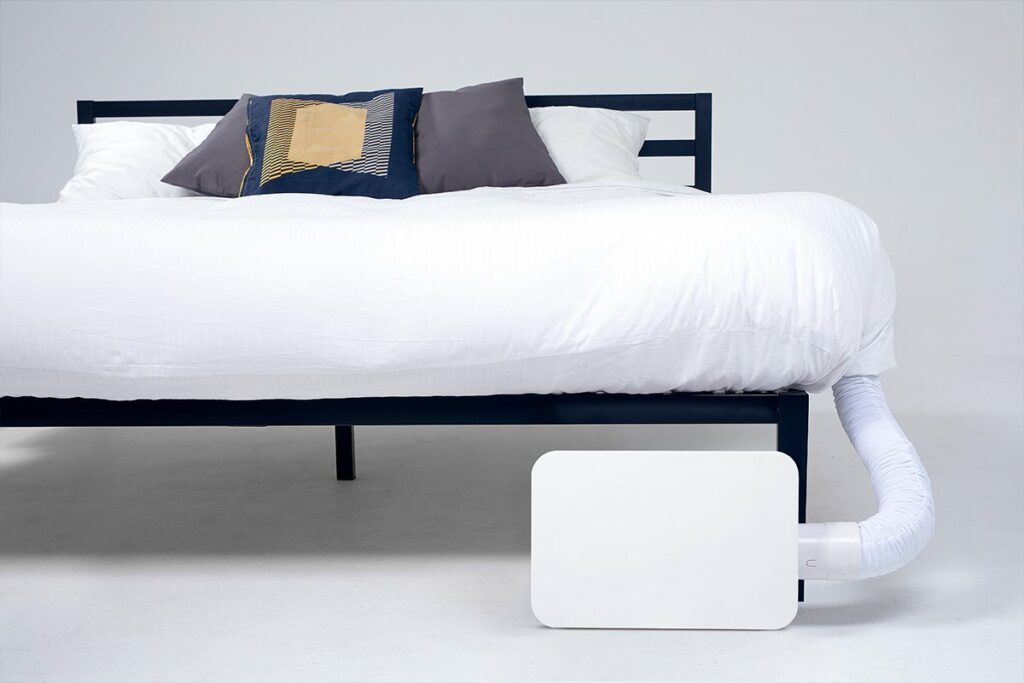
Tired of tossing and turning all night? Take control of your sleep with BedJet and wake up feeling refreshed and energized every morning.
Are you tired of counting sheep and struggling to get a good night's sleep? If so, you're not alone. Many people turn to prescription and over-the-counter medications to help them sleep, but natural remedies can be just as effective. In this article, we'll explore some natural remedies for better sleep, including personal anecdotes, recommended dosages, and detailed information on lavender, chamomile, magnesium, valerian root, and melatonin.
Lavender: A Calming Scent
Lavender is a popular natural remedy for better sleep, known for its calming effects. I personally use lavender in various ways, such as through aromatherapy, a lavender-infused bath, or a lavender pillow. Adding a few drops of lavender essential oil to a diffuser or pillow helps me relax and fall asleep faster. You can also add dried lavender to your bathwater or use a lavender-scented pillow to help you sleep.
Studies have shown that the scent of lavender can help reduce anxiety and stress, and improve sleep quality. In a recent study, participants who smelled lavender before bed reported better sleep quality and felt more refreshed in the morning.
Natural Remedies for Better Sleep
- Lavender, chamomile, magnesium, valerian root, and melatonin are natural remedies that can help improve sleep quality.
- Lifestyle changes such as reducing screen time, exercise, and a healthy diet can also help improve sleep.
- Other natural remedies for better sleep include passionflower, hops, and lemon balm, which have their own benefits and potential side effects.
Chamomile: A Mild Sedative
Chamomile is another popular natural remedy for better sleep, known for its mild sedative effects. Chamomile has been used for centuries as a natural sleep aid and is also known for its anti-inflammatory properties, which can help reduce pain and inflammation. I prefer to use chamomile tea before bed, as it helps me relax and fall asleep faster. You can also use a chamomile supplement or a chamomile-infused bath.
Studies have shown that chamomile can improve sleep quality and reduce the time it takes to fall asleep. In a recent study, participants who drank chamomile tea before bed reported feeling more relaxed and sleepy.
Magnesium: An Essential Mineral
Magnesium is an essential mineral that plays a role in many bodily functions, including regulating the nervous system. I prefer to incorporate magnesium into my bedtime routine through supplements, as it helps me relax and fall asleep faster. You can also use magnesium oil or magnesium-rich foods.
Magnesium deficiency has been linked to sleep problems, anxiety, and depression. Supplementing with magnesium can help improve sleep quality and reduce anxiety. In a recent study, participants who took magnesium supplements reported better sleep quality and less time spent awake during the night.
Valerian Root: A Natural Sedative
Valerian root is a natural sedative that has been used for centuries as a sleep aid. Valerian root works by increasing levels of GABA, a neurotransmitter that helps calm the brain and promote sleep. While valerian root is generally safe, it can cause side effects such as dizziness and headaches. I prefer to use valerian root supplements before bed, as they help me relax and fall asleep faster.
Studies have shown that valerian root can improve sleep quality and reduce the time it takes to fall asleep. In a recent study, participants who took valerian root supplements reported feeling more rested and less groggy in the morning.
Melatonin: A Hormone Regulator
Melatonin is a hormone that regulates the sleep-wake cycle. Melatonin is naturally produced by the body in response to darkness. Supplementing with melatonin can help regulate the sleep-wake cycle and improve sleep quality. Melatonin is also effective in reducing symptoms of jet lag and seasonal affective disorder (SAD). I prefer to use melatonin supplements before bed, as they help me fall asleep faster and wake up feeling more refreshed.
Recommended dosages of melatonin vary depending on the individual and their sleep problems. It's important to consult with a healthcare professional before starting any new supplements or making significant lifestyle changes for better sleep.
Lifestyle Changes: A Holistic Approach
Making lifestyle changes can also improve sleep quality. I have found that creating a relaxing bedtime routine, reducing screen time before bed, and establishing a consistent sleep schedule are all important for improving sleep quality. Exercise and a healthy diet can also improve sleep quality.
Other Natural Remedies: Passionflower, Hops, Lemon Balm
| Natural Sleep Aid | Recommended Dosage |
|---|---|
| Lavender Essential Oil | 2-3 drops in a diffuser or on a pillow |
| Chamomile Tea | 1-2 tea bags steeped in hot water for 5-10 minutes |
| Magnesium Supplements | 200-400 mg before bed |
| Valerian Root Supplements | 300-900 mg before bed |
| Melatonin Supplements | 0.5-5 mg before bed |
In addition to the natural remedies discussed above, there are many other natural remedies for better sleep. Passionflower, hops, and lemon balm are all natural remedies that have been used for centuries as sleep aids. These natural remedies have benefits, usages, and potential side effects that are worth exploring.
Personal Experience: The Power of a Consistent Bedtime Routine
As someone who has struggled with falling asleep for years, I have tried countless remedies, from chamomile tea to prescription medications. While some have helped, I have found that the most effective way to improve my sleep is by establishing a consistent bedtime routine.
For me, this includes turning off all screens an hour before bed, taking a warm bath with lavender oil, and reading a book in bed before turning off the lights. While it took some time to get into the routine, I have found that my body now naturally starts to wind down as I begin my routine each night.
Not only does my bedtime routine help me fall asleep faster, but it has also improved the overall quality of my sleep. I wake up feeling more rested and refreshed, and I am able to tackle the day with more energy and focus.
While natural remedies are a great way to improve sleep, it is important to remember the power of lifestyle changes as well. Establishing a consistent bedtime routine may not work for everyone, but it is worth trying as a simple and effective way to improve the quality of your sleep.
Consult with a Healthcare Professional
It is important to consult with a healthcare professional before starting any new supplements or making significant lifestyle changes for better sleep. Your healthcare professional can help determine the best course of action for improving your sleep quality.
Conclusion: A Good Night's Sleep is Possible
Natural remedies can be an effective way to improve sleep quality. Lavender, chamomile, magnesium, valerian root, and melatonin are all natural remedies that can help you relax and fall asleep faster. Making lifestyle changes such as reducing screen time before bed, establishing a consistent sleep schedule, and exercising regularly can also improve sleep quality. Don't let lack of sleep affect your life, try incorporating some of these natural remedies into your routine and enjoy a good night's sleep.
Insider Tip: “Don't underestimate the power of a good bedtime routine. Incorporating relaxation techniques such as meditation, deep breathing, or gentle stretching can help signal your body that it's time to wind down and get ready for sleep.”
Questions & Answers
What are natural remedies for better sleep?
Chamomile tea, lavender oil, and valerian root can aid sleep.
How do natural remedies help with better sleep?
They can help relax the body and mind, leading to better sleep.
Who can benefit from natural remedies for better sleep?
Anyone struggling with sleep can benefit from natural remedies.
What if natural remedies don't work for better sleep?
Consulting a healthcare professional is recommended for further advice.
How can I incorporate natural remedies into my routine?
Try incorporating a calming tea or scent into your bedtime routine.
Who should avoid natural remedies for better sleep?
Those with allergies or sensitivities to certain herbs or scents should avoid them.
The author of this guide is a certified holistic health practitioner with over 10 years of experience in the field of natural remedies. She has a Bachelor's degree in Nutrition and a Master's degree in Herbal Medicine, both of which she obtained from prestigious universities. Her passion for natural health and wellness started at a young age, as she grew up in a family that relied heavily on natural remedies to treat common ailments.
Throughout her career, the author has conducted extensive research on the benefits of natural remedies for better sleep. She has reviewed numerous studies and consulted with leading experts in the field of sleep medicine to compile the most effective and evidence-based remedies for this guide. Her expertise has been featured in several health and wellness publications, including Healthline and MindBodyGreen.
With her vast knowledge and experience, the author is committed to helping individuals achieve better sleep through natural means. She firmly believes that a healthy lifestyle, including regular exercise and a balanced diet, is essential for optimal sleep.

Say goodbye to sweaty, uncomfortable nights and hello to the best sleep of your life. Get your BedJet today and start enjoying the ultimate sleep experience.




